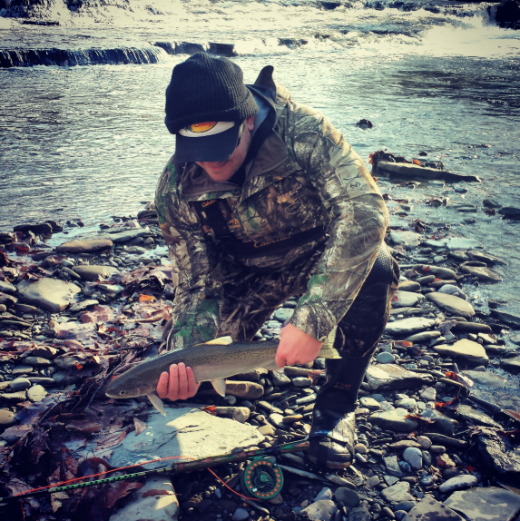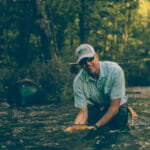Above: Asian carp threaten the economically vital fisheries of the Great Lakes. Below: Filter-feeding carp could devastate Great Lakes steelhead and salmon, and the opportunities to fish for them.
By Taylor Ridderbusch
A recently completed survey shows that an overwhelming number of Great Lakes residents support immediate action to build structural protections to keep Asian carp out of the lakes.
The survey commissioned by the Great Lakes Partnership to Block Asian Carp asked people in Illinois, Indiana, Michigan, Ohio and Wisconsin about their understanding of the threat posed by the fish, filter feeders that would do lasting damage to salmon, steelhead and lake trout food supplies and threaten a $16 billion outdoor recreational economy.
In August 2017, the U.S. Army Corps of Engineers proposed an action plan to address the issue. After studying five alternatives for preventing the spread of invasive species, particularly Asian carp, into the Great Lakes, the Corps settled on a $275 million “tentatively selected plan.” This includes a range of advanced technological defenses at the Brandon Road Lock and Dam in Joliet, Illinois: complex noise, water jets, an engineered channel, a new electric barrier, and a flushing lock.
More than 90 percent of those surveyed believe it’s important to immediately take steps to block the carp from reaching the Great Lakes, and over 70 percent support a “fair share” funding proposal under which the states would help foot the bill for the project. More than 80 percent support having Michigan pay the share of any state that can’t pay its own portion to block Asian carp.
 Michigan Gov. Rick Snyder says in a statement the poll results “clearly demonstrate that Great Lakes residents understand that the time to act on Asian carp is now.”
Michigan Gov. Rick Snyder says in a statement the poll results “clearly demonstrate that Great Lakes residents understand that the time to act on Asian carp is now.”
TU supports the Corps’ recommendation, which provides for an increased array of protective measures to protect this important fishery. This is a step in the right direction and will provide more time to implement a permanent solution to protecting the Great Lakes from Asian carp infiltration—a complete separation of the lakes from the Illinois and Des Plaines rivers.
We are working with other sportsmen’s groups and conservation partners to mobilize support for the plan. The Corps needs to act quickly to adopt the proposal, and then Congress and state officials need to fully fund it. Last year, we generated hundreds of public comments in favor of the Corps’ plan. This year, working with TU’s Illinois Council and Elliot Donnelly Chapter, the National Wildlife Federation, the Indiana Wildlife Federation, the Michigan United Conservation Clubs, and Ducks Unlimited, we hosted two Asian carp briefings to educate sportsmen and women about the issue.
And last month, TU joined our partners in meeting with Army Corps of Engineers representatives in Washington, D.C., to discuss moving the Brandon Road plan forward.
The plan faces opposition from the shipping industry, which contends that the construction and additional technology barriers will add costly delays, and argue that the electrical barrier presents safety concerns. Last year, the new administration held up the plan at the request of 16 Midwestern congressmen. It was only thanks to the advocacy of supportive lawmakers, sportsmen’s groups, and our conservation partners that the Corps continued the process by releasing its report for public comment.
It is crucial that we continue to show our support for this initiative. For more information about how to help, please contact me at tridderbusch@tu.org.
Taylor Ridderbusch, based in Michigan, is TU’s Great Lakes organizer.



